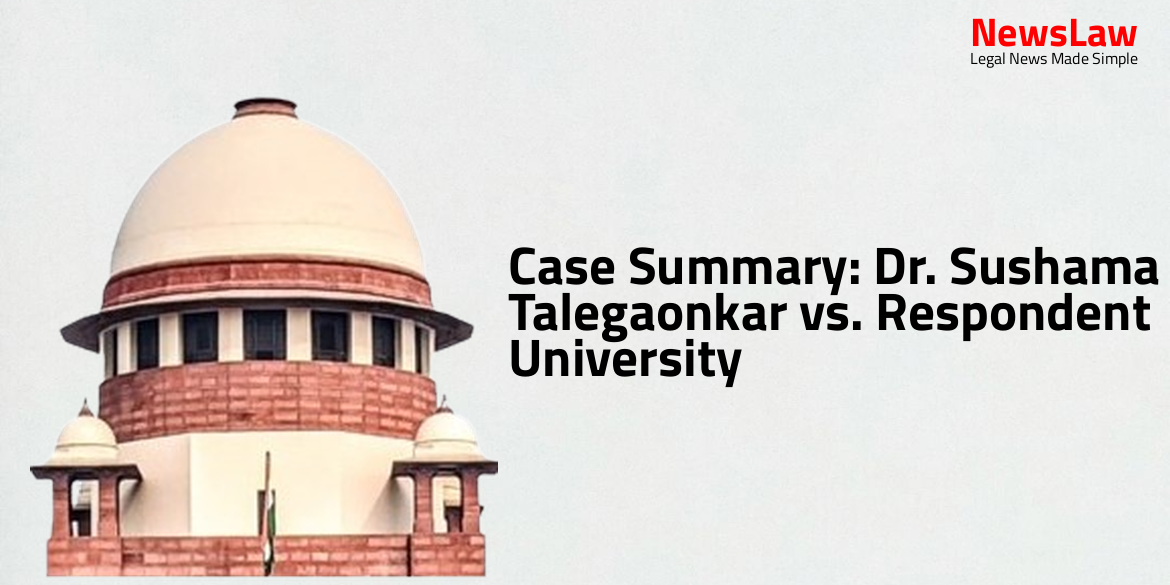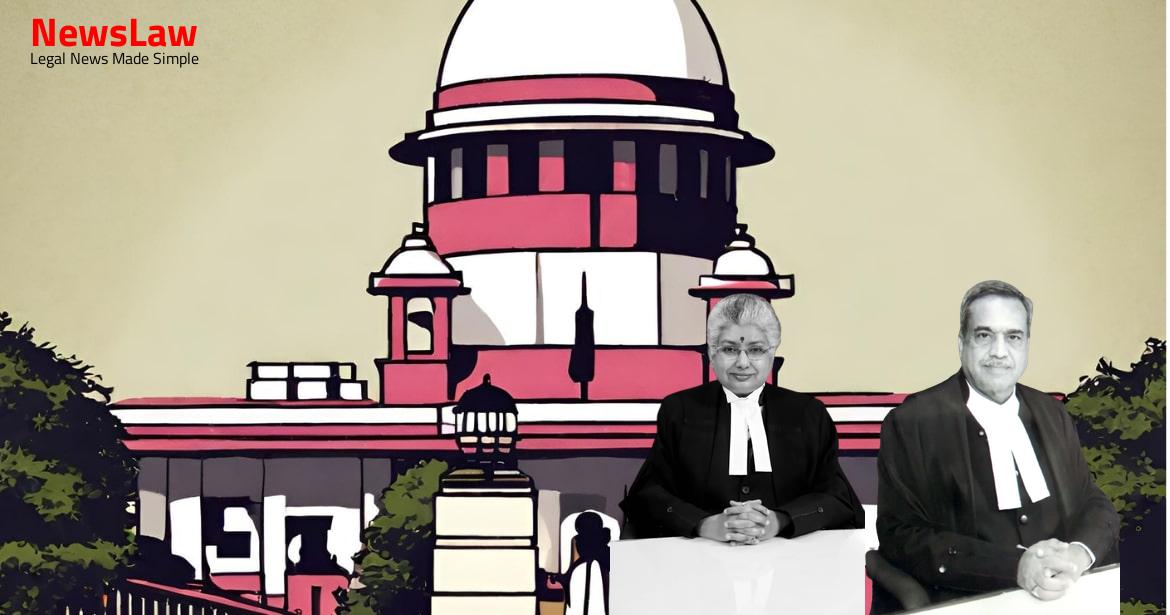In a significant ruling by the Supreme Court of India, a judgement was passed regarding the return of a deposited amount in the SARFAESI Act case. The case involved a dispute over the deposited amount between the parties. The Court’s decision addresses key aspects of the SARFAESI Act, setting a precedent for similar cases in the future.
Facts
- Three OTS proposals made by the appellants on 27.06.2017, 01.08.2017, and 19.08.2017 for Rs.84, 87 and 90 crores respectively.
- Possession notice under Section 13(4) of SARFAESI Act issued by the Bank on 22.08.2017.
- Demand notice issued under Section 13(2) of SARFAESI Act on 15.03.2017.
- Account of the appellant declared NPA by the Bank on 29.09.2015.
- A bid of Rs.120,00,11,000/- received in e-auction conducted by the Bank on 06.10.2017.
- Appellants revised OTS proposal to Rs.140 crores after the bid was received in the e-auction.
- Bank filed CMP No.4761 of 2018 seeking appropriation of Rs.40 crores deposited by the appellants.
- Appellants filed CMP No.5386 of 2018 for the refund of the Rs.40 crores.
- Bank challenged the order dated 11.10.2017 by filing Special Leave Petition in the Supreme Court.
- Sale notice issued with a reserve price of Rs.120 crores on 29.08.2017.
- CWP No.2274 of 2017 filed before the High Court challenging various notices and orders.
- High Court directed appellants to deposit Rs.140 crores with the Bank before proceeding further.
- Highest bidder in the auction paid 25% of the bid amount after the sale confirmation on 07.10.2017.
- High Court ought not to have interfered in the matter while exercising
- Court heard arguments of learned counsel for both parties
- Bank directed to take decision on petitioners’ request within four weeks
- If petitioners succeed, they shall pay interest to auction bidder on amount deposited
- Auction purchaser not obligated to deposit remaining balance amount until further orders
- No opinion expressed on rights and claims of the State
Arguments
- Mr. P.S. Patwalia argued that the deposit of Rs.40 crores with the Registry of the High Court was to show the appellants’ good faith in their offer.
- Since the Writ Petition was deemed not maintainable and the Bank rejected the offer, the deposited amount should be returned to the appellants.
- Mr. B.C. Negi mentioned the petitioners’ readiness to deposit Rs.140 crores with the lead Consortium Bank to establish their good faith.
- The deposit of Rs.140 crores with the Punjab National Bank would prevent any coercive action against the petitioners as they still hold physical possession of the assets.
- Mr. S. Guru Krishna Kumar, Senior Advocate for the Bank, supported the view taken by the High Court.
- The High Court’s directions were considered justified as the appellants’ dues exceeded the value obtained from asset sale.
- The directions were seen to protect the Bank’s interests and serve public interest.
- The High Court’s directions were in line with the principles in the Axis Bank case, as they did not allow the Bank’s application entirely but required the amount to be deposited without any lien.
Also Read: CRPF Act: Validity of Rule 27 for Compulsory Retirement – Case of Head Constable vs. CRPF
Analysis
- The bank’s prayer to deposit the Rs. 40 crores with the DRT is partially accepted, but the borrower/guarantors’ request for refund of the amount is turned down.
- The deposit of Rs. 40 crores was made to show good faith and was not towards satisfying the debt.
- The bank is entitled to proceed only against secured assets mentioned in the notice under Section 13(2) of the SARFAESI Act.
- The pre-deposit made under Section 18 of the Act is not a secured debt and is with the Tribunal, not the bank.
- The bank’s general lien over the deposit was rejected as the money was not with the bank.
- Under Section 13(11) of the Act, the secured creditor can proceed against guarantors or sell pledged assets first.
- If the suit filed by the bank is dismissed, the amount deposited may be refunded to borrower/guarantors unless appropriated in certain circumstances.
- The pre-deposit for entertaining an appeal under Section 18 of the Act is not a secured asset.
- The High Court’s orders are set aside based on the analysis of the SARFAESI Act and relevant legal provisions.
- The decision in Axis Bank vs. SBS Organics (P) Ltd. was relied upon to support the judgment.
- The borrowers’ request for refund of Rs. 40 crores is found unsubstantiated in the given context.
- The High Court was cautioned against interfering in matters related to Authorised Officers of banks in the writ jurisdiction
- Specifically mentioned the case of Authorised Officer, State Bank of Travancore and Anr. Vs. Mathew K.C. (2018) 3 SCC 85 as an example
- Emphasized that such interference could create unnecessary hurdles in the functioning of banking institutions
- Secured creditors have the right to proceed against guarantors or sell pledged assets without taking specific measures first
- This right is in addition to the rights conferred on secured creditors under the Act
- The secured creditor can take action against guarantors or pledged assets independently
- The money in question was meant to be with the Registry of the High Court as per the order.
- The entitlement of the appellants has been established.
- The direction for the money to remain with the Bank does not negate the appellants’ claim.
- Referring to the law as per the precedent set by the court in Axis Bank, the appellants have the right to withdraw the deposited sum from the Bank.
Also Read: DAMEPL vs. DMRC: Curative Petition and Arbitral Award Restoration
Decision
- The appeals have been allowed in the aforesaid terms.
- The judgment and order dated 19.03.2019 passed by the High Court has been set aside.
- CMP No.5386 of 2018 preferred by the appellants has been allowed.
- The amount deposited by the appellants in terms of the order dated 11.10.2017 is directed to be returned to them within two weeks along with any accrued interest.
- No costs are awarded.
Case Title: M/S KUT ENERGY PVT.LTD Vs. THE AUTHORIZED OFFICER PUNJAB NATIONAL BANK
Case Number: C.A. No.-006016-006017 / 2019



